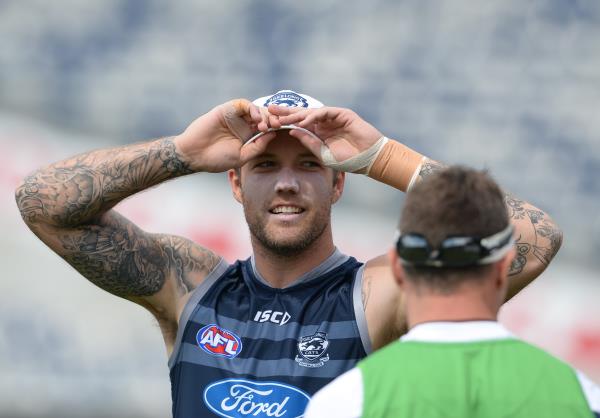By JOHN VAN KLAVEREN
GEELONG coach Chris Scott likes to have options.
He had some last year but always wanted more.
So 2015 should be considered option year; a season in which the Cats have plenty of flexibility.
Scott got what he wanted with the recruitment of Mitch Clark and Rhys Stanley, two athletic big men who can hold down a key position or roam the ground in the ruck.
While perhaps not quite up to the running standard of Mark Blicavs, Clark and Stanley are more-developed footballers who provide match-up difficulties for opponents.
That’s not to say that tall utility Blicavs is out of a job – it just extends the number of options Scott has from week to week.
Ageing stars Jimmy Bartel and James Kelly have played mainly forward and back respectively in the past two seasons but their versatility will be utilised to the maximum this season if the NAB Challenge is any guide. Ditto Steve Johnson.
The Cats under Scott have always warmed to an option-style game, with defenders Harry Taylor and Andrew Mackie keen to drift forward and put their names on the scoreboard.
Doing something the opposition doesn’t expect and which causes them to reshuffle is now a serious tactic in the AFL.
Geelong has been on the receiving end of it often enough – the 2008 grand final still the most glaring example.
Where keeping players in regular roles and sticking to routines was once the accepted wisdom, horses for courses is becoming the way more teams try to set up.
The option game has been at the heart of many lively discussions in America’s National Football League, from which AFL coaches as well as management have increasingly sought inspiration.
It means AFL will become a more coach-driven game, just like the NFL where all the players do is execute instead of taking decision-making upon themselves out on the ground.
Of course, NFL games are almost entirely set plays instead of the fast-flowing Aussie rules style of play, so set pieces do not translate as well.
But using the flexibility offered by athletic multi-talented players allows coaches to try create situations to the team’s advantage.
And teams still need players to show skills, desire and effort, especially to overcome the lapses for which Geelong now has a reputation.
The real question will be how Geelong’s coaching staff makes use of the variety on offer, starting with team selection and making changes on the fly to counter the opposition’s chess moves.
It will be an interesting season.









